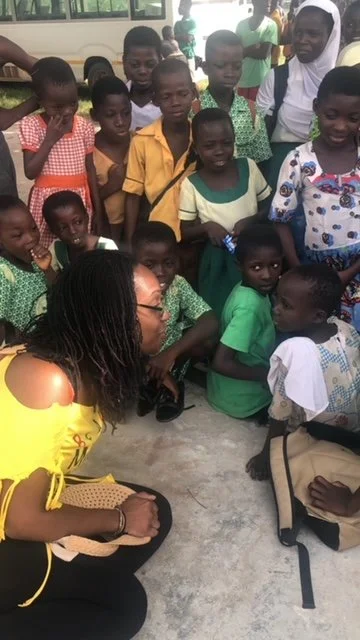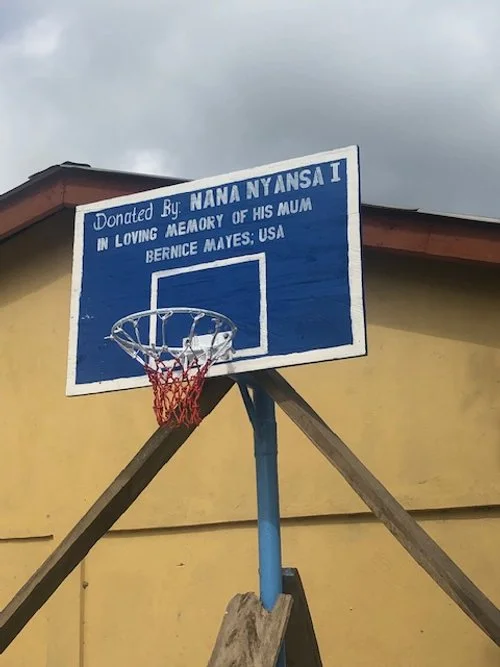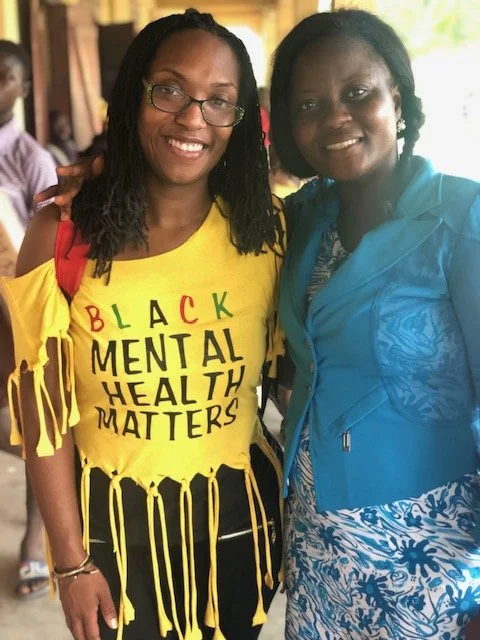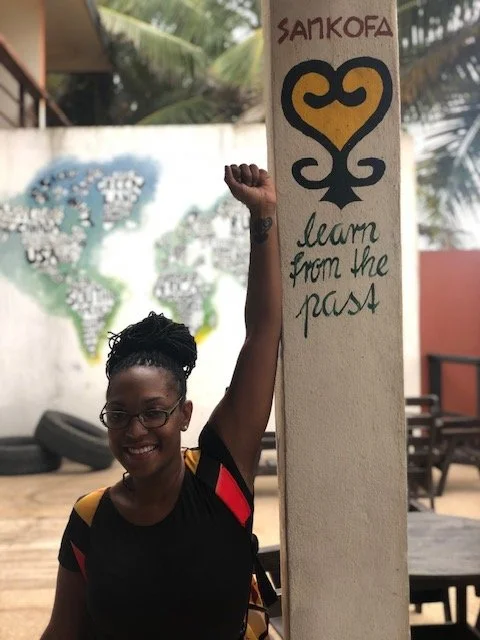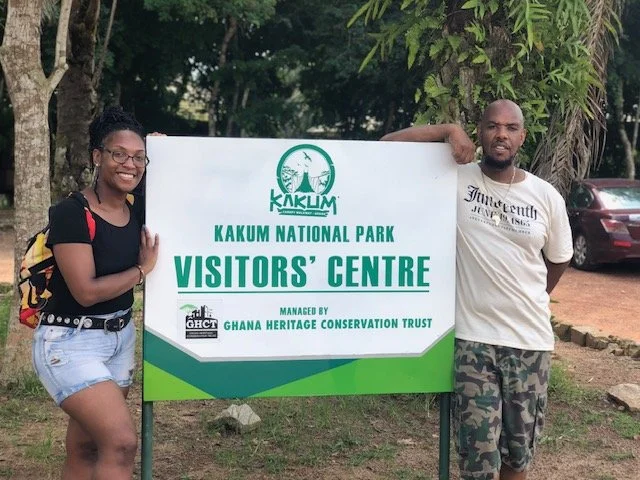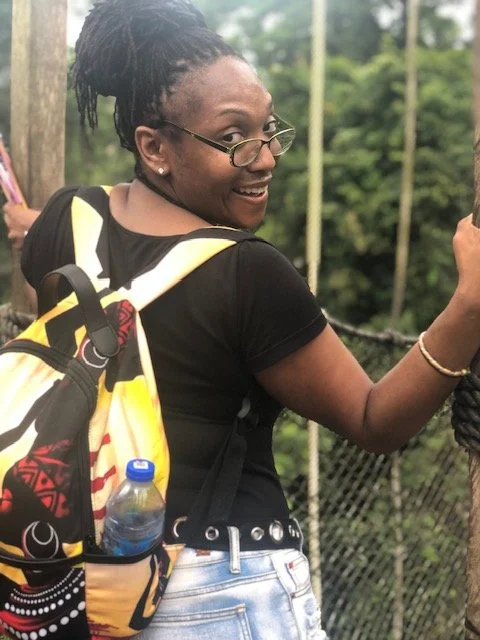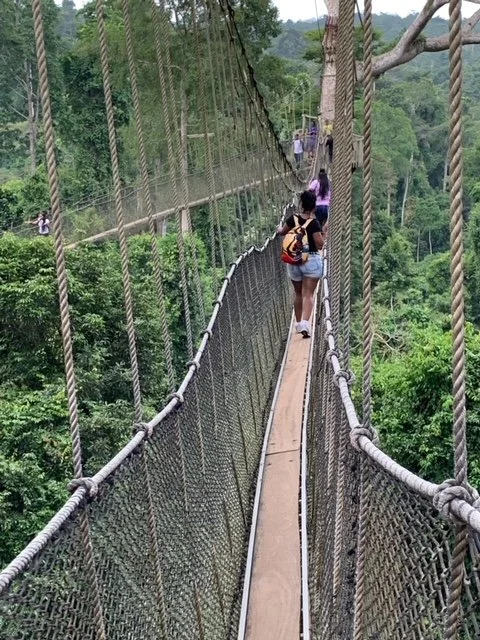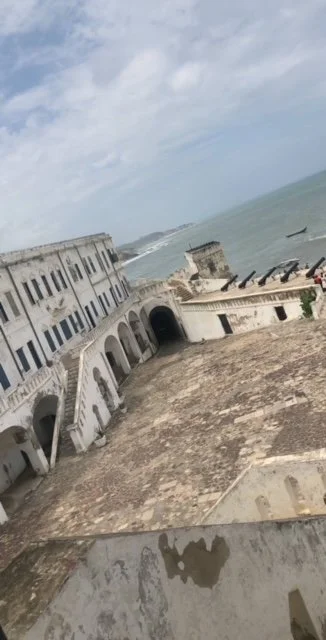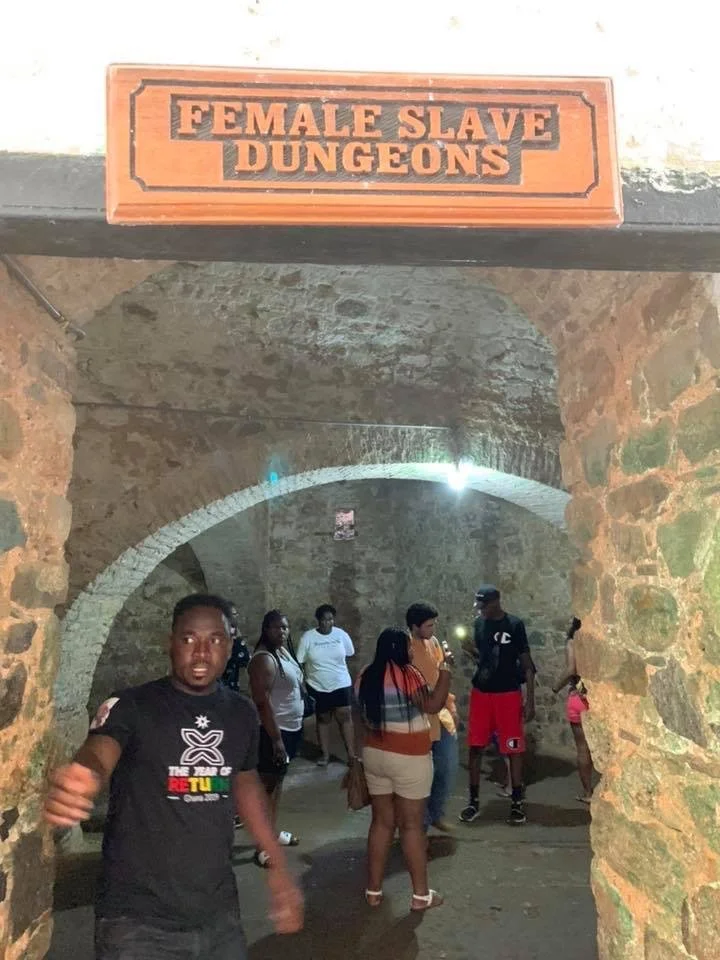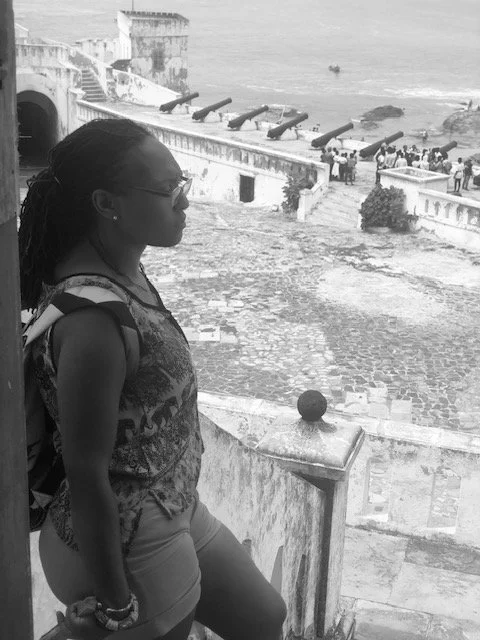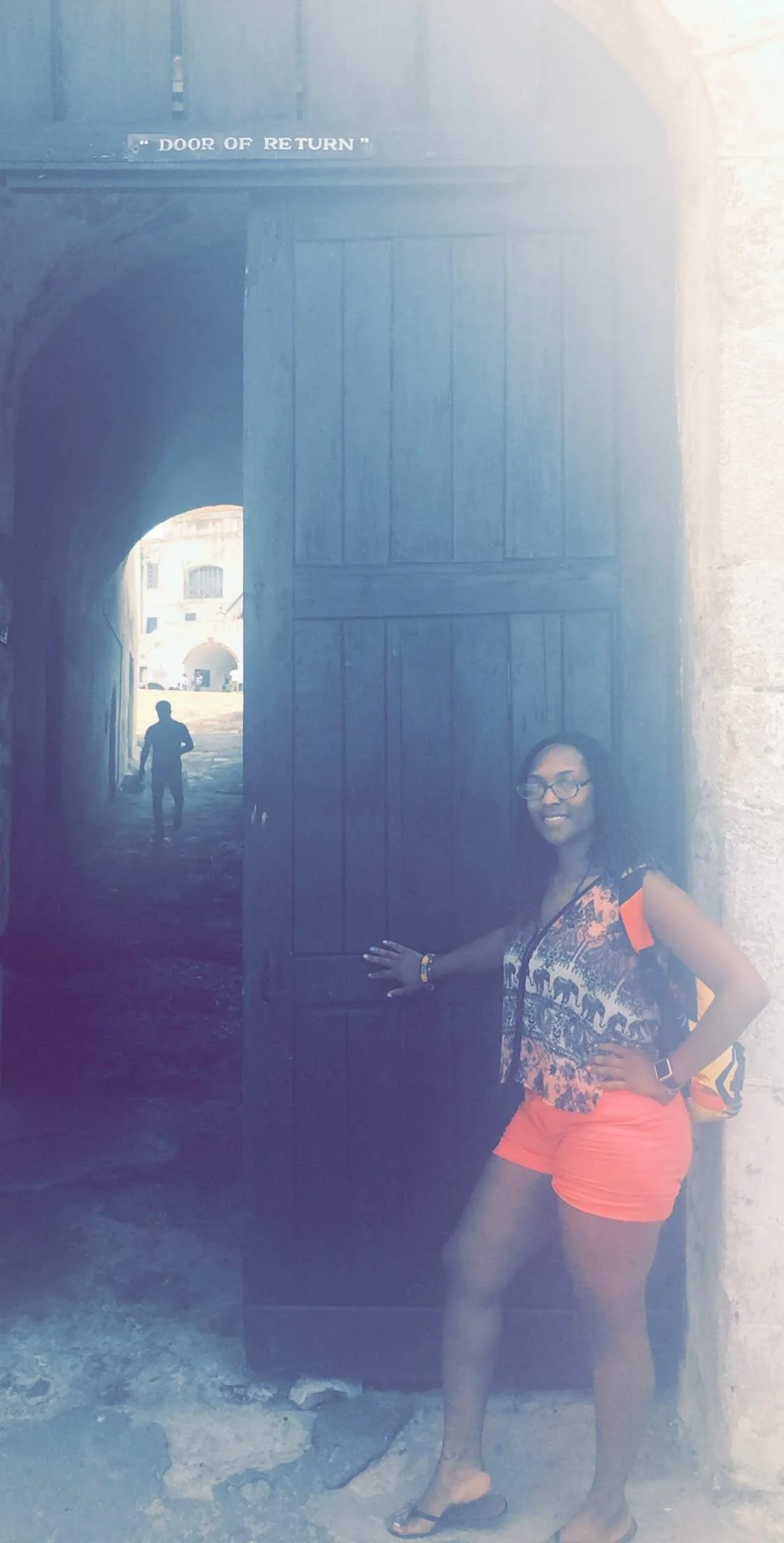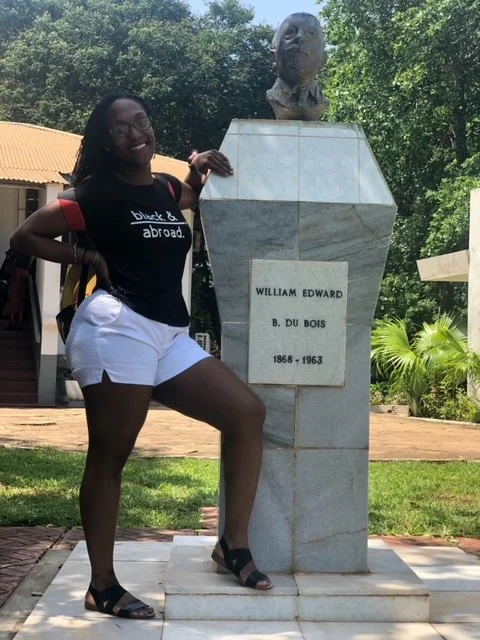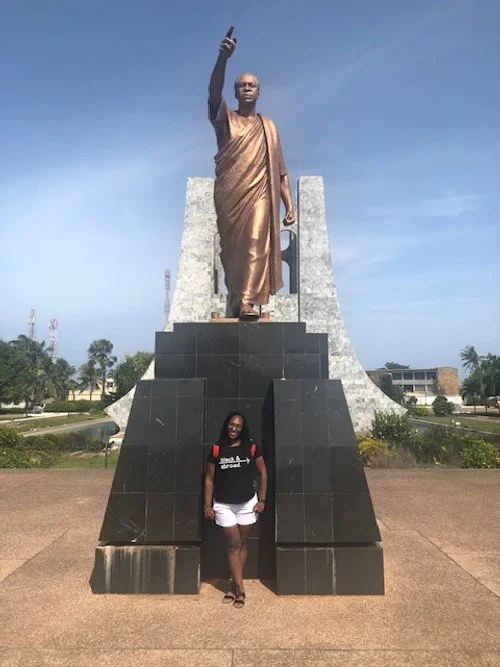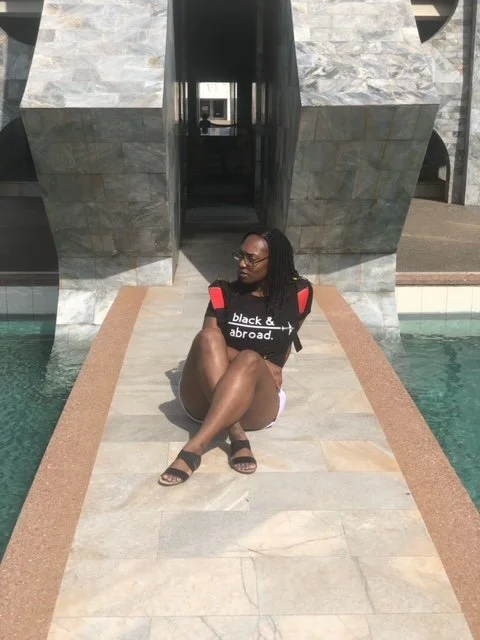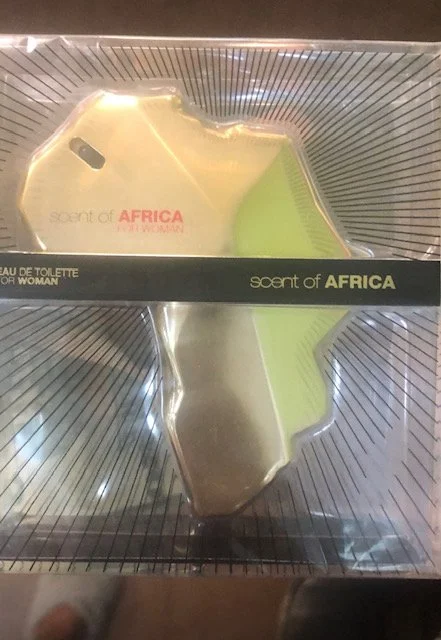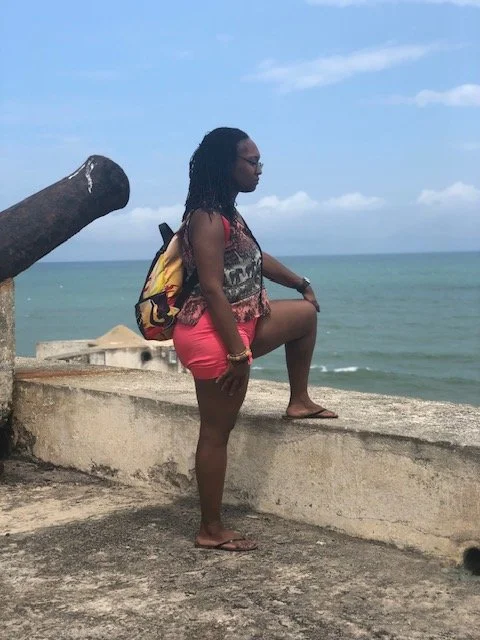My First Visit to Ghana: A Journey of Homecoming, Healing, and History
In 2019, I visited Ghana for the very first time during the Year of the Return. It was a year dedicated to honoring the 400 years since the first enslaved Africans were brought to America. For me, it was more than a trip. It was a calling. I felt like I needed to experience it for myself, to return home to a place I had never been, yet somehow always belonged to.
All I needed to prepare was the yellow fever vaccine. From Memphis, I flew to Chicago on Southwest since flights there are always inexpensive. I spent time with my sorority sister and line sister, which felt grounding before beginning such a big journey. After that, I met up with the kids and my dad’s best friend and business partner, and together we boarded our international flight.
We had a layover in Brussels, waiting several hours before continuing to Ghana. The anticipation was almost overwhelming. My mind was full of questions about what I would feel, how I would be welcomed, and what this trip would mean for me.
When we finally landed in Accra, signs all over the airport read, “Welcome Home.” The people called us their brothers and sisters. The energy was so warm, inviting, and full of love. I had never experienced anything like it. I truly felt embraced by a homeland I had never known, yet deeply belonged to. From there, we traveled to Cape Coast, where the women & girl students stayed in a mansion Airbnb with full-time groundskeepers and housekeepers, and the men stayed at a resort nearby. We often gathered for meals at the resort, which quickly became our routine.
In regards to prices, I paid $300 for my round trip to Chicago and $1300 for my roundtrip flight to Ghana. In regards to food, fun, extra, I brought $500 and had money remaining when I came back. I didn’t pay for housing.
Here’s how the journey unfolded day by day.
Day 1: Memphis to Chicago – Sisterhood Before the Journey
My journey began in Memphis. I caught a Southwest flight to Chicago, so I could fly with the group. Before heading to Ghana, I spent some time with my sorority sister and line sister. It was great to catch up face to face after quite some time.
Day 2: Chicago to Accra (Layover in Brussels)
From Chicago, I joined the group I would be traveling with. It was me, the kids, and my dad’s best friend and business partner. We boarded our flight to Ghana with a layover in Brussels. The anticipation was overwhelming. My mind was filled with excitement, nervousness, and a deep curiosity about what this journey would mean for me.
Day 3: Welcome Home to Accra, Then Cape Coast
When we landed in Accra, the first thing I saw were signs saying, “Welcome Home.” The people called us their brothers and sisters. I felt so welcomed, as if the land itself was embracing me. The energy was good and full of love.
From there, we began the drive to Cape Coast, where our housing was arranged. The women stayed in a mansion Airbnb with full-time groundskeepers and housekeeping, and the men stayed at a nearby resort. We often came together for meals at the resort, which quickly became our family rhythm. The area itself was beautiful, lush, and peaceful.
Before settling in fully, we stopped at the University of Cape Coast and visited their radio station. My dad works in radio and seems to know people everywhere, so of course he had connections there too. Walking through the station was fun and eye-opening, especially knowing students were gaining real-world broadcasting experience in a space that connected them to the world. It was another reminder of how small the world can feel when passions and networks overlap.
Day 4: Rest and Restoration
This day was dedicated to rest. The travel had caught up with us, and the seven–hour time difference hit hard. Jetlag is no joke when your body is adjusting to an entirely new rhythm. I found myself waking up in the middle of the night and feeling tired in the middle of the day. Taking this time to simply breathe, stretch, and allow my body to settle into Ghana’s pace was necessary. Sometimes travelers feel guilty for not doing more, but rest is part of the experience. It is how you give yourself space to be fully present in the days to come.
Day 5: My Father’s Village – A Homecoming Beyond Words
Visiting my father’s village was undefinable. My dad is not only the Chief of Development, he is also a recognized chief by the country’s government. A chief is equivalent to a king, and they treated him as such. His name is Nana Nyansa, and his heart has been set on building schools, libraries, and computer centers to expand education access for the children. During our time there, he presented them with new white boards, backpacks, and laptops. Since this trip, he has helped them build a school, library, and other resourceful spaces. Since our visit in 2019, he has helped develop a Vocational Training Center and is opening a new Academy. I’m proud of him and the work he has done with the community and their continued growth, in partnership.
When I arrived, I was greeted with love and honor, given the name Princess Akua Ohenewaa, also known as Wednesday Born Princess. The children followed me everywhere I went. There were moments where I simply sat and talked with them about life, not even realizing people were taking snapshots of me. Those captured moments mean the world to me now. We played volleyball together and they all wanted to be on my team, though eventually we created a good mixture of both sides for fun. Their laughter and excitement made me feel alive in a new way.
The moment that took my breath away was when we were surprised with a basketball court named after my grandmother. It was such a touching tribute and showed how deeply her legacy continues to live on through the work my father has done.
Being in the village also opened my eyes to many realities. I learned that the women have a hard time getting access to menstrual supplies. When we returned home, we immediately started a drive to collect and send items, though I also learned how long and complicated the process of shipping to Ghana can be. I also witnessed cultural practices such as cutting girls’ hair to keep it manageable, and I faced the painful truth that child brides are still common in many places. The average income in the village was less than $500/year at the time of our visit. The actions some take under the guise of survival most often becomes detrimental to girls and women. This is not something that everyone face, but it is not uncommon. Just like in the United States, poverty places many in difficult situations. Many don’t know that child brides are still legal in some states in the United States!
Back to the trip before I get too off track…
Despite the challenges, there was overwhelming joy. The Naming Ceremony was filled with music, drums, dancing, and community celebration. It felt like home, welcoming me in and embracing us in ways I had never been embraced before. I knew in that moment that I would always have a home there, and that one day, I would return for a longer stay. That day is growing closer.
Day 6: Kakum National Park – Courage in the Canopy
The morning began with breakfast at the resort, and before we left, we witnessed something unforgettable. A group of fishermen were pulling in a massive net from the water, practicing group fishing that required everyone’s strength. Each man held onto the rope, their bodies moving in rhythm, tugging together with patience and power. It was teamwork at its purest form, and it reminded me how survival and abundance often depend on unity.
As I walked around the resort, I noticed adinkra symbols carved and painted on the walls and columns. Each symbol carried history and wisdom. My eyes stopped at one that made me pause: Sankofa. It is the same symbol I have tattooed on my body; my wrist to be exact. Its meaning is “Learn from the past and pull forward.” To see it there in Ghana, in the very land of its origin, felt like confirmation. It reminded me that this journey was not random. It was alignment.
From there, the next adventure was Kakum National Park, one of Ghana’s natural treasures. We hiked through the forest, climbing steep paths to reach the canopy walkway. Once we arrived, the view was breathtaking. The bridges were narrow and swayed as we walked, suspended almost 150 feet above the ground attached to the trees. Looking down, all I could see was endless green stretching into the horizon. There were 7 bridges in total, that spanned over a quarter of a mile.
At first, I was terrified. My heart raced and I gripped the ropes tightly. But as I continued across each bridge, fear began to melt into exhilaration. Each step felt like a victory. I even met women from the United States who were on a girls’ trip, and together we cheered each other on across the walkway. It was one of those moments where you realize that fear and courage can exist side by side. The only way to discover your strength is to keep moving. I left Kakum proud of myself for pushing through, carrying both the fear and the joy with me.
My Dad captured a picture of me walking one of the bridges
Day 7: Cape Coast Slave Castle – A Life-Changing Encounter
This was the most emotional day of the trip. We visited the Cape Coast Slave Castle, one of the most haunting and important historical sites in Ghana. Standing before the whitewashed walls of the castle, it was hard to reconcile its beauty with the horror that took place inside. The castle is massive, with courtyards, cells, and chambers that once held thousands of enslaved Africans before they were forced onto ships bound for the Americas.
Walking through the dungeons where men and women were held was suffocating. The air felt heavy with sorrow. The floors were dark and stained from centuries of human suffering. I stood in rooms where hundreds of women were once crammed together without food, without care, bleeding and dying from neglect. I could almost hear their cries, feel their desperation. It was overwhelming to know my ancestors passed through these very halls.
We learned how Africans, after tribal wars and the commitment of crimes, sometimes sold captives to Europeans, not realizing the horrific fate that awaited them across the ocean. Some did know and exchanged people for weapons and goods. This betrayal was heartbreaking to hear. What began as a system of servitude was twisted into something far more dehumanizing. The Europeans fortified the castle with cannons and defense structures, preparing to fight to keep their trade alive.
There is another, even larger castle nearby—Elmina—but we did not have the chance to visit. Still, Cape Coast Castle left an imprint on my soul. It was not just a tour, it was a reckoning. To stand in the “Door of No Return,” the passage where captives were led onto ships, was a moment I will never forget. I pressed my hand against the stone and felt the echoes of the past vibrate through me.
At the end of the tour, something powerful happened. We came across the “Door of Return.” When you first enter the castle, it is marked as the “Door of No Return” to signify the millions who left and never came back. But now, on the other side, it has been renamed the “Door of Return.” This was meant to honor those of us who have come back, not only to remember but to reclaim. It was a call to Sankofa, to go back and fetch what was lost, to heal the wounds of our ancestors, and to ensure that their memory fuels our future. Walking back through that door reminded me that our story does not end in pain; it continues in resilience, in remembrance, and in the responsibility to carry the light forward.
Day 8: A Night Out in Accra
We returned to Accra and checked into the 5 star hotel, Earl Heights (video below). It was one of the student’s birthday and they wanted to go out, explore, and have some fun. What stood out to me was that the clubs did not check IDs, so even the students we were chaperoning got in. Everyone had a good time, and the music was largely American. It was a blend of worlds that reminded me how much of our culture is intertwined across continents.
Day 9: Honoring Legacy at W.E.B. Du Bois’ Home and the Kings and Presidents Memorial
We spent the morning at the W.E.B. Du Bois home in Accra, and it was one of the most moving stops of the entire trip. Walking through his home, surrounded by walls lined with books and liberation work, felt like stepping into the mind of someone who gave his entire life to Black advancement. His presence still lingers there. The air carried a quiet determination, as if his spirit was reminding me that education and the pen are powerful tools in the fight for freedom.
I stood in the study where he wrote, where he organized, where he dreamed. To think that W.E.B. Du Bois, a man who challenged the world’s perception of Black people, chose Ghana as his final resting place, spoke volumes. He found home here. He found belonging. He found peace. As someone who has committed my own life to writing, teaching, and documenting our stories, it felt like standing in the footsteps of one of my ancestors in purpose.
Books in his library
I thought about how his work continues to ripple across generations. His writings on the “double consciousness” of being Black in America still ring true today. Visiting his home made me realize that travel, writing, and teaching are not just passions for me, they are my assignment. W.E.B. Du Bois, Maya Angelou, James Baldwin, Josephine Baker and Nina Simone all left America at one point in search of clarity and freedom, and their journeys influenced their art, their words, and their vision.
Being in his home confirmed that I am part of that same lineage. I am not just writing for myself, I am writing for us. As I write this, I’m becoming more excited for my transition. There are so many beautiful examples of growth from those who took a leap of faith and moved to a new country.
After leaving Du Bois’ home, we visited the memorial that honors Ghana’s kings and presidents. The grounds were filled with statues, timelines, and monuments that documented leadership, vision, and resilience. As I walked slowly through, I felt the weight of responsibility it takes to lead, but also the pride of standing among people whose heritage is royal and unbroken. These memorials were a reminder that history is not in the past. It lives in us, it guides us, and it pushes us forward.
That day left me deeply inspired to continue building my own legacy. To honor my ancestors not just with words, but with action.
Day 10: Boxing Club, Shopping, and Farewell
On our final day, we visited a famous boxing club in Accra. It was vibrant, full of energy and life. Watching the athletes train reminded me of the resilience and determination that is woven into the spirit of Ghana. It felt like the perfect way to close the trip before we headed back home.
We also had the opportunity to go shopping at the Accra Mall. It was a mall that looked similar to home. I came across a perfume called “Scent of Africa” and it instantly became my favorite perfume. I bought more than one and I still have some left haha.
Reflections on Ghana
This trip changed me. Ghana gave me a sense of belonging that I had not realized I was missing. It made me think about history, about healing, about legacy, and about the responsibility I carry to live fully. It was more than an itinerary. It was a homecoming.
If you are ever considering traveling to Ghana, know that you are not just visiting a place. You are returning to a land that holds the story of ancestors’ who were silenced. Be open to feeling, learning, and growing. The experience will forever stay with you, just as it has with me.



